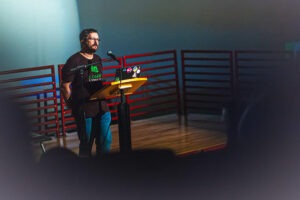“OK, that was clickbait, a distro like that would be great,” our man in Italy answered when we asked about the headline. “Point is, it may be irrelevant, unless…”

Fellow FOSS Force writer Larry Cafiero just presented a modular Linux distro that aims to become the workhorse of the EU’s Public Sector.
In and by itself that’s a great idea and I sincerely wish that project success. If it were adopted by every public administration in the EU, from Bruxelles to the most backward municipalities, it would be sure progress compared to the current situation.
Ditto if the distro was adopted everywhere, not just in public administrations. As long as it’s 100% Free as in Freedom, having the same Linux-based GUI installed by default on every desktop or laptop from North Cape to Malta and from Cabo da Roca to the Urals — because, why not? — would be great. Seriously.
FOSS enthusiasts horrified by the perspective of one distro instead of dozens should consider that “pre-installation” is one major reason why every year since 1985 has been The Year of the Windows — and NOT the Linux — Desktop.
Many more people, however, prefer or need be creative or productive by what they must do with, rather than to software. For those people, having just one GUI, one file manager, one mail client, et cetera on every digital device they may use would be a feature, not a bug.
At the same time, projects like EU OS seriously worry me. I fear that no matter how well-intentioned they are, they may end up being not just irrelevant unless other things happen, but serious distractions from those same things.
Seven FOSS-based projects the EU should support now!
To prevent that disgrace, here are seven projects that, in the same spirit of Eurostack, the EU should officially support in the Free/Open Source space regardless of, and surely well before, any switch to any Linux.
- Mandatory courses of REAL digital literacy for every EU civil servant, at all levels. The full content of such courses is a topic for another post. Here, I’ll just say that by “real digital literacy” I don’t mean wasting resources to teach everybody to code. Call me paranoid, but I fear that placing code and programming first may contribute to producing societies that consider “smart” things like these hypothetical examples:
- Dropping toy laptops on unprepared children and teachers.
- Letting people without real culture, maturity, or empathy:
- Short-circuit everybody’s mental health.
- Demanding trillions of dollars to clone themselves or permanently mutilate governments…
…only and exactly because they were so good at coding that nobody should constrain them, ever.
- Flat out prohibition of storing or exchanging documents in proprietary file formats in any public archive of any public institution. Why? Because human beings write and run software because they need to handle digital documents, not the other way around.
With software, just as with boxes, the most innovative innovation is really open standardization of the right things. In software, it’s software and protocols, because that’s what locks people in, before and better than proprietary software does.
Saying that Free as in Freedom source code is what matters most because if two FOSS programs are not compatible anybody can write conversion filters for them was dumb in 2006, and it’s even dumber now. More often than not, what denies people the freedom to cooperate is not closed source software, as any activist ghosted on networks like Twitter or Facebook can testify.
That’s why I’ve been saying for twenty-four years now that using Microsoft Office to store and exchange documents only in ODF formats would be better for society than a using LibreOffice to accept or distribute files in Microsoft formats.
For more on how and why Free as in Freedom file formats matter more than software, read this.
Note: this should be Chapter 1 of digital literacy courses, even before “don’t add journalists to chats with tools you should never use for classified information anyway,” and “don’t put your passwords online.”
- An officially supported alternative to Android that the average smartphone user can easily and safely install by themself, with every civil servant prohibited from using any other mobile platform for work, and no tariffs (sorry, I couldn’t help it) for any smartphone maker that preinstalls it on its devices.
- (Strictly related to #3) mandatory adoption of Nextcloud for every public cloud service. In a world where smartphones outnumber adults and everything is in the cloud, almost nobody would notice if The Year of The Linux Desktop finally came. On the same note, here’s a call to all EU hackers, ISPs, and digital decision-makers: develop permanent personal clouds already!
- An instant messaging system for the 21st century that’s 100% Open Source, 100% multiplatform, and 100% multi-account, instead of being thirty years behind email, terribly unpolite, and above all, so seriously stupid as to use phone numbers as account names, which WhatsApp, Signal, and Telegram do.
- Search engines that just work, which may be the easiest thing on this list to do. Just seriously sponsor DuckDuckGo, or since the patent has expired, clone the 2005 version of Google.
- A European way to do AI that makes sense.
Did I forget anything?

Marco Fioretti is an aspiring polymath and idealist without illusions based in Rome, Italy. Marco met Linux, Free as in Freedom Software, and the Web pre-1.0 back in the ’90s while working as an ASIC/FPGA designer in Italy, Sweden, and Silicon Valley. This led to tech writing, including but not limited to hundreds of Free/Open Source tutorials. Over time, this odd combination of experiences has made Marco think way too much about the intersection of tech, ethics, and common sense, turning him into an independent scholar of “Human/digital studies” who yearns for a world with less, but much better, much more open and much more sensible tech than we have today.






Marco,
A good article, with some good points.
First, let’s define what a “distro” is versus a “spin”. Please pardon me as I try to make this simple for other readers.
A “distro” takes all the elements of an operating system (kernel, utilities, package manager, etc. etc) and puts it together. Today it defines what format you use for the packages, what repositories you use, etc. Red Hat vs Debian are good examples of two DISTROS. It takes a lot of work to develop a separate DISTRO. It makes for a lot of incompatibilities between distros that we have tried to fix over the years with the Linux Standard Base project, containers, flatpacks, etc.
A “spin” takes a distro and determines the “look and feel” and what defaults you have when installing the system. There are lots of “spins” from Debian.
I would encourage the EU to do a “spin” at most, since it would give greater compatibility to applications that already run on top of the DISTRO the spin was based on.
Secondly, having a SPIN for the EU being installed on so many laptops and desktops INSTEAD of Microsoft would reduce the cost of the laptops for the end users.
Installing another distribution instead of the EU spin would (at most) cost only the time needed for the installation. And having the SPIN work perfectly with the hardware that the EU had been preinstalled almost guarantees that any distribution/spin would also work perfectly. Having the SPIN installed in a store selling laptops and desktops (and despite the smartphone usage, these stores still exist) it would educate the average customer to GNU/Linux. I think the “year of the desktop” would jump about two decades closer in one year.
Having one “SPIN” would also make it easier to write documentation and do training. When I wrote “Linux for Dummies” I chose the distribution that was going to go in the back of the book. I wrote all the examples and scripts necessary to install that distribution and start using it by cutting and pasting the screen shots. The reader could literally type in exactly the same thing I typed and come up with exactly the same results. It would have been almost impossible to do that if half the readers were using GNOME and the other half using KDE. A unified EU distribution would make it a lot easier to develop and deliver training.
Hardcore Linux users would cry out for “choice”. Choice is fine I am sure that once people have learned one desktop they can make up their minds about another desktop. There can also be an “anti-EU” spin or distro. The point would be to get the people using GNU/Linux in the first place.
Requiring that the EU have interchangeable file formats is also great start, but we also need standards in what fonts are allowed. Pagination issues would not exist if the same fonts were used properly between word processors and presentation packages.
Proprietary font packages should not be used, particularly in new documents. There should be a default set of freely available fonts that are installed as the default, and be the ONLY fonts allowed in government or legal documents.
Likewise spreadsheet standards should also be expanded to forbid proprietary macros in new documents.
As I said, a good article, but I would support an EU spin being installed on every laptop and desktop used in government and legal work.
Marco, Also, while I would agree with the seven points that you brought out as things that should be done, that does not say that other things people have worked on over the years should be denigrated. In past writings you have stated that the ability to use source code to change things is limited to “the elite”. I assume you mean those people with programming skills and who join in some free software project, and that the masses do not have that skill. This, of course, is true.
However many people can develop those skills if they wanted to and when they do develop those skills they could make changes to the code, even if those changes are only to fix a bug that is bothering them. They do not even have to talk to the developers of the software. They can not do that with closed source code.
OR if they do not have those skills they can determine if fixing that problem is worth hiring someone with the skills to develop the patch and submit it. While this is possible with closed source software you have to get the agreement of the software manufacturer to apply the patch and distribute it.
Actually, I disagree with your statement “Here, I’ll just say that by ‘real digital literacy’ I don’t mean wasting resources to teach everybody to code.” I think it is important to teach people that the computer is not cognizant (at least not yet) and is really quite stupid. This does not mean they have to be trained to be a software engineer, but using systems like Turtle to create some simple programs would help teach logic.
Your article could have been just as strong by simply saying “These are seven things that would make open computing even better” in addition to the EU OS.